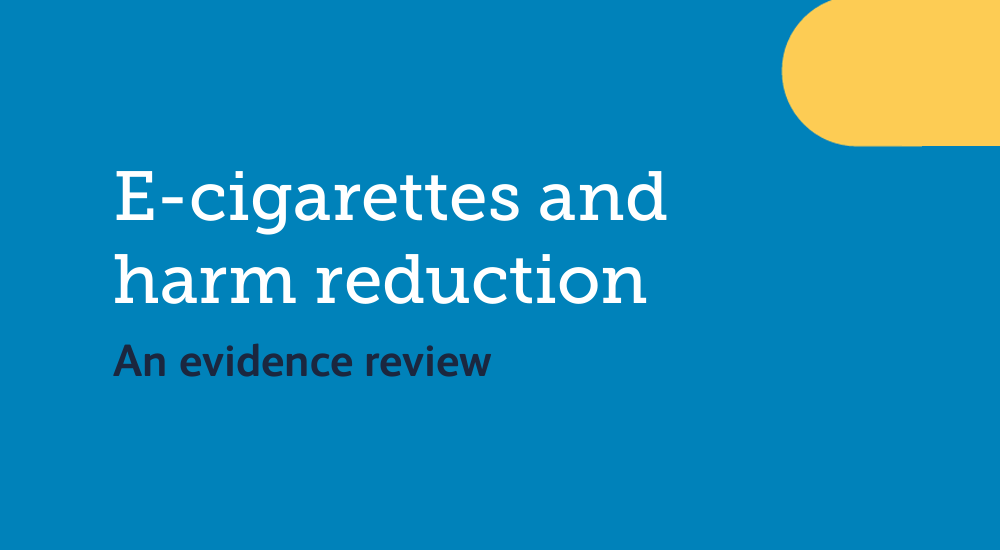SARG contributes to major new report on e-cigarettes

The Sheffield Addictions Research Group has contributed to a major new report on e-cigarettes from the Royal College of Physicians.
The report, 'E-cigarettes and harm reduction: An evidence review', explores several themes including how e-cigarettes can be used to support more people to make quit attempts while discouraging young people and never-smokers from taking up e-cigarettes.
SARG team members Alan Brennan, Duncan Gillespie, Damon Morris and Luke Wilson reviewed current models to assess the cost-effectiveness of using e-cigarettes for smoking cessation (section 4.7) and looked in depth at potential pricing policy options for e-cigarettes including for example reducing VAT on e-cigarette devices, introducing excise tax on disposable vapes and subsidising e-cigarettes for people accessing stop smoking support (section 6.3).
Their work contributes to wider debates about health and economic considerations around e-cigarette use and demonstrates how modelling can play an important role in understanding the benefits and drawbacks of different approaches.
This is the third report by the Royal College of Physicians that the Sheffield Addictions Research Group has been involved with. In 2018 we contributed to 'Hiding in plain sight: Treating tobacco dependency in the NHS' while in 2021 we provided content for 'Smoking and health 2021: A coming of age for tobacco control?'
Tobacco research at the University of Sheffield
The report comes during a period of rapid growth in tobacco research at the University of Sheffield.
We are collaborating with colleagues at University College London on a major project funded by Cancer Research UK to develop new detailed modelling of tobacco smoking and quitting behaviour, participating in a new 'Health Hub' consortium in which we will develop models of regional tobacco policy alongside other commercial determinants of health, and are developing bids to model new e-cigarette policy.
We are also evaluating new smoking cessation services in hospitals, funded by Yorkshire Cancer Research, and the government's 'Swap to Stop' e-cigarette scheme, as part of the Department of Health and Social Care's Policy Research Unit in Addictions.
Our modelling work was also instrumental in the development of the Tobacco and Vapes Bill which aims to create a 'smoke-free generation' and reduce the number of smoking related deaths.
Further reading
SYNTAX – 'Integrated evidence synthesis for joint appraisal of tobacco and alcohol tax interventions for harm reduction in the UK'. This project provided evidence and tools to inform the potential scale of effects of taxation across tobacco and alcohol as an intervention to improve public health and reduce health inequalities in the UK.
STAPM – 'The Sheffield Alcohol and Tobacco Policy Modelling Platform'. The aim of the STAPM research programme is to identify and evaluate approaches to reducing the harm from tobacco and alcohol, with the aim of improving commissioning in a public health policy context.
Tobacco and new nicotine product pricing policy: past, present and future (February 2024) An overview of Duncan Gillespie's talk at a SPECTRUM Consortium event exploring the potential impact of various pricing strategies on tobacco use and public health.
SARG researchers share insights into youth and student drinking at national conference
Researchers from the Sheffield Addictions Research Group (SARG) recently presented their findings on youth and student drinking trends at the Student Health Association Annual Conference, held from Sunday 29 June to Tuesday 1 July 2025 in Sheffield.
SARG researchers co-author new book exploring 'culture of caution' in youth drinking decline
A new book by an international team of experts, including researchers from the Sheffield Addictions Research Group (SARG), unpacks the complex social, cultural and economic factors driving the decline in young people's alcohol consumption.
SARG's Lucy Burke wins Open Research Prize 2025
Lucy Burke, a Qualitative Research Associate and PhD Student with the Sheffield Addictions Research Group (SARG), has been awarded the University of Sheffield Open Research Prize 2025 in the Postgraduate Researcher (PGR) category.
SARG showcases research at School of Medicine and Population Health event
Researchers from SARG are set to showcase their work at the University of Sheffield's School of Medicine and Population Health Research and Innovation Meeting 2025.
You might also be interested in…
Dr Duncan Gillespie speaks on the Communicable Research podcast
SARG Senior Research Fellow Duncan Gillespie features in the latest episode of the SCHARR Communicable Research podcast 'Quitting Cigarettes: Making cessation support inclusive and equitable'.
SARG work cited at Health and Social Care Committee inquiry
SARG work on the combined effects of tobacco and alcohol pricing policy was mentioned in the Health and Social Care Committee inquiry on tobacco, alcohol, gambling and drugs this week.
Targeting multiple levels of 'the smoking cessation system' using novel scientific approaches
This programme will develop and apply novel scientific approaches to increase the population rate of smoking cessation.
